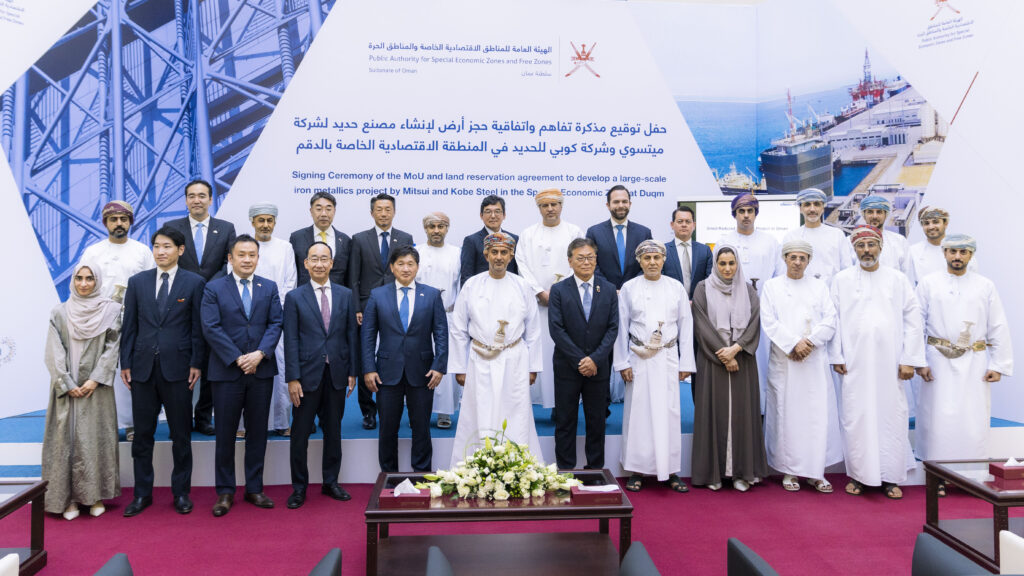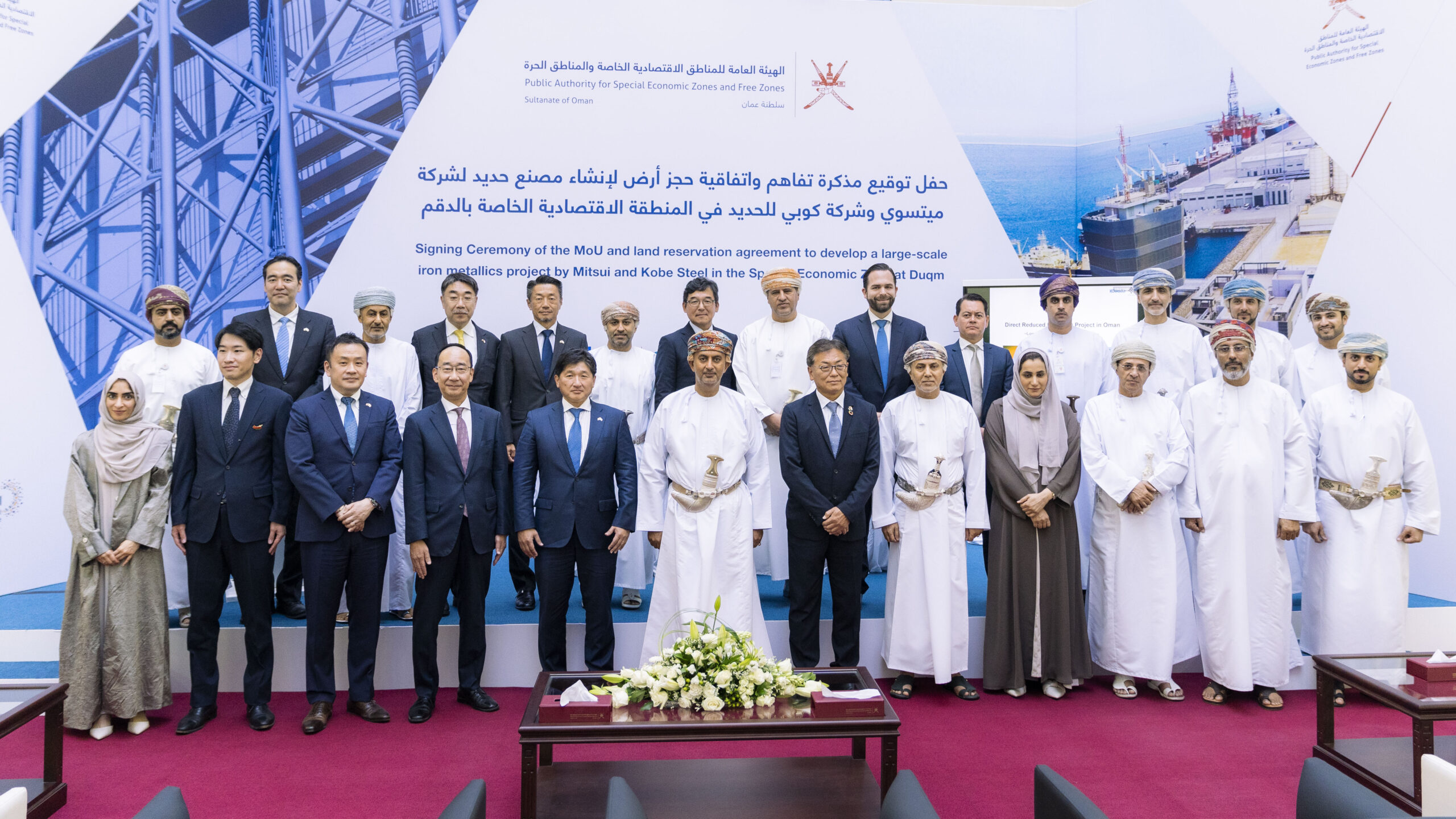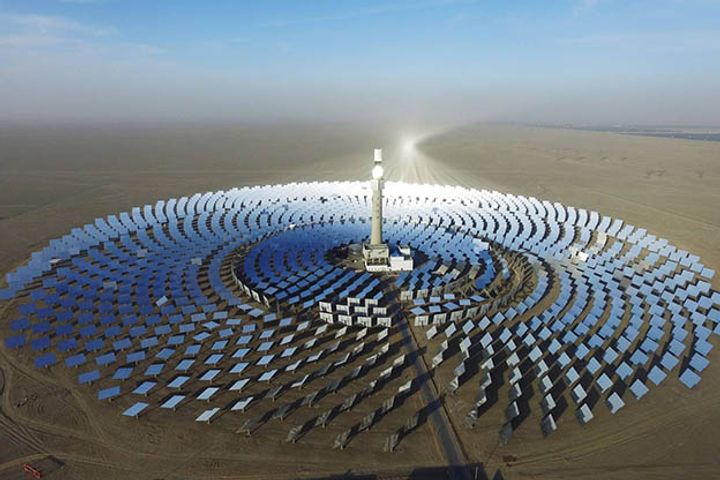
MUSCAT: The Public Authority for Special Economic Zones and Free Zones (OPAZ)signed a Memorandum of Understanding (MoU) with Kobe Steel, a leading Japanese steelmaker, and Mitsui & Co, Ltd, a global trading investment company, to develop a low CO2 iron metallics project in the Special Economic Zone at Duqm (SEZAD).
At the same time, Kobe Steel and Mitsui signed a land reservation agreement with Port of Duqm Company and inked another MoU with the Centralized Utilities Company (Marafiq), to supply the project with power and water.
The MoUs were signed by Dr Ali bin Masoud al Sunaidy, Chairman – OPAZ, Masahiro Motoyuki, Executive Officer and Head of Engineering Business at Kobe Steel, and Tetsuya Fukuda, Executive Managing Officer and Chief Operating Officer of Mineral and Metal Resources Business Unit at Mitsui & Co. The land reservation agreement was signed by Reggy Vermeulen, CEO – Duqm Port, while the MoU with Marafiq was signed by Eng Abdullah al Hashimi, Managing Director of Marafiq.
The event was attended by Ibtisam bint Ahmed al Farooji, Under-Secretary of the Ministry of Commerce, Industry and Investment Promotion for Investment Promotion, Jota Yamamoto, Ambassador of Japan in Muscat, representatives of companies and other dignitaries.
The project is expected to produce five million tonnes of Direct Reduced Iron (DRI) annually through the Midrex Process. By using a technically and commercially proven production method, Kobe Steel and Mitsui aim to provide a near-term decarbonisation solution to the steelmaking industry. In the long run, the project will aim for further decarbonisation through measures such as replacement of natural gas with hydrogen and carbon capture, utilisation and storage, with a goal to expand production capacity as well.
Further, Kobe Steel and Mitsui will conduct the detailed business study, with an aim to commence low CO2 iron metallics production by 2027. The product will be supplied to businesses in Asian including Kobe Steel and other global markets such as Europe.
Speaking on the occasion, Dr Ali bin Masoud al Sunaidy, Chairman – OPAZ, stated: “Bringing this unique project to the Special Economic Zone at Duqm marks a valuable addition to the already under development list of remarkable international metal and mineral projects and green energy projects in the Zone and will attract other related and supporting industries and businesses.”
Dr Al Sunaidy added: “The project is a great addition to the steelmaking industry in the Sultanate of Oman, as well as it will enhance In-Country Value (ICV) by supporting local Small and Medium-Sized Enterprises (SMEs) and by offering job openings.”
Tetsuya Fukuda, Chief Operating Officer of Mineral and Metal Resources Business Unit at Mitsui, said: “The Sultanate of Oman is a country rich in natural gas reserves necessary for producing DRI and is also one of the globally outstanding locations for renewable energy, making it a highly suitable area for competitive green hydrogen. Mitsui also has a trusting relationship with the Sultanate of Oman through existing businesses including oil and gas upstream investments, LNG projects, and IPP businesses.”
Masahiro Motoyuki, Executive Officer and Head of Engineering Business at Kobe Steel stated, “With combination of our steelmaking experience, our key technologies such as Midrex Process, and the collective strength of Mitsui operating global business in the natural resources and energy fields, Kobe and Mitsui will continue to contribute to the reduction of GHG emission within the steelmaking industry with hopes of achieving a carbon-neutral society.”
Reggy Vermeulen, CEO of Port of Duqm, stated, “We are delighted to have Mitsui & Co. and Kobe Steel developing a low CO2 iron metallics project at Port of Duqm. Mitsui is a Japanese trading and investment company having global presence and their upcoming project at Port of Duqm immensely strengthens their position in Oman, while Kobe Steel is globally renowned for a Japanese leading steelmaking company and their Midrex technology for low carbon DRI process, which is widely considered to be the future of steel making. The project is expected to bring an important foreign direct investment and has the potential to create a significant number of jobs at Duqm.”







